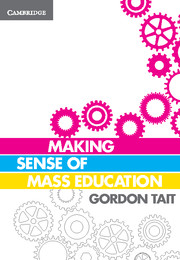Book contents
- Frontmatter
- Contents
- Acknowledgements
- INTRODUCTION
- PART 1 RE-ASSESSING THE THREE PILLARS: MODERN AND POSTMODERN SOCIOLOGIES OF EDUCATION
- PART 2 THE FOUNDATIONS OF AN ALTERNATIVE APPROACH: EDUCATION AND GOVERNANCE
- PART 3 CULTURAL CONTEXTS OF CONTEMPORARY EDUCATION
- PART 4 PHILOSOPHY AND MASS EDUCATION
- CONCLUSION
- References
- Index
PART 3 - CULTURAL CONTEXTS OF CONTEMPORARY EDUCATION
- Frontmatter
- Contents
- Acknowledgements
- INTRODUCTION
- PART 1 RE-ASSESSING THE THREE PILLARS: MODERN AND POSTMODERN SOCIOLOGIES OF EDUCATION
- PART 2 THE FOUNDATIONS OF AN ALTERNATIVE APPROACH: EDUCATION AND GOVERNANCE
- PART 3 CULTURAL CONTEXTS OF CONTEMPORARY EDUCATION
- PART 4 PHILOSOPHY AND MASS EDUCATION
- CONCLUSION
- References
- Index
Summary
Having addressed some of the theoretical foundations of education, both from within the familiar modernist paradigm – though with some ground given to the logic of postmodernity – and also from within a Foucault-inspired governmental approach, the next part examines some of the cultural issues, concerns and contexts impacting upon contemporary education. While there is no direct, correlative link between the culture of a society, and the kind of schools it contains – where the latter is simply a function of the former – it would be a mistake to think that there are not important connections between the two. Indeed, a better approach might be to not consider them as discrete entities at all.
Chapter 7 The media addresses the relationship between education and the news media. It questions the assertions that ‘media studies’ is not a serious subject, and doesn't belong in the school curriculum; that media messages need an education to decode properly; and that the media is not responsible for whipping up moral panics, whether to further specific political ends, or to simply sell papers and gain viewers.
Chapter 8 Popular culture investigates recent concerns over the increasing presence of popular culture in the classroom. It questions the common view that all popular culture is rubbish, unlike ‘high culture’; that teachers need to be popular culture experts if they are going to connect with their students; and that the classroom is no place for popular culture, as it has absolutely no educational value.
- Type
- Chapter
- Information
- Making Sense of Mass Education , pp. 141 - 142Publisher: Cambridge University PressPrint publication year: 2012



